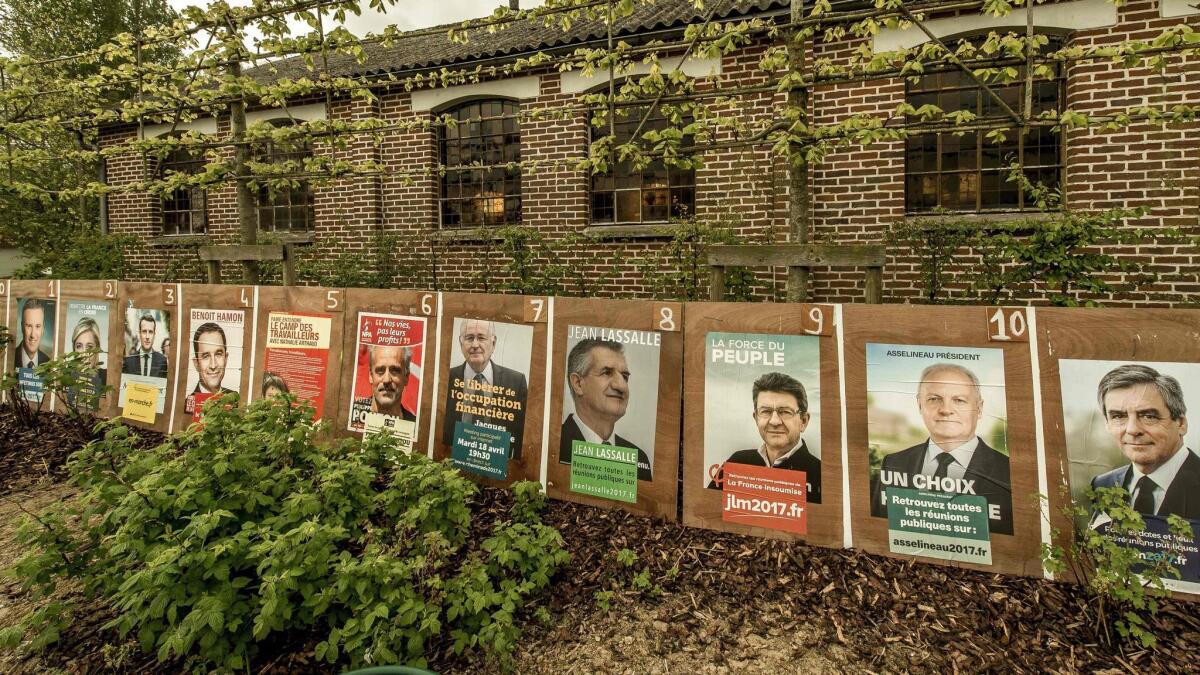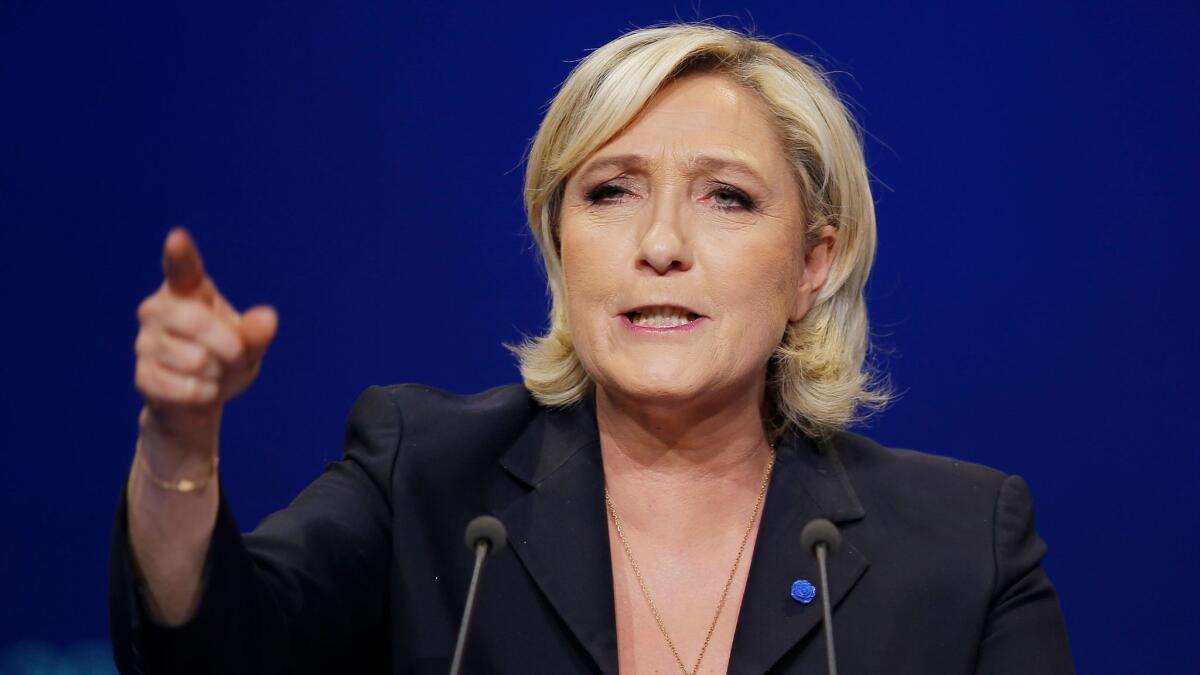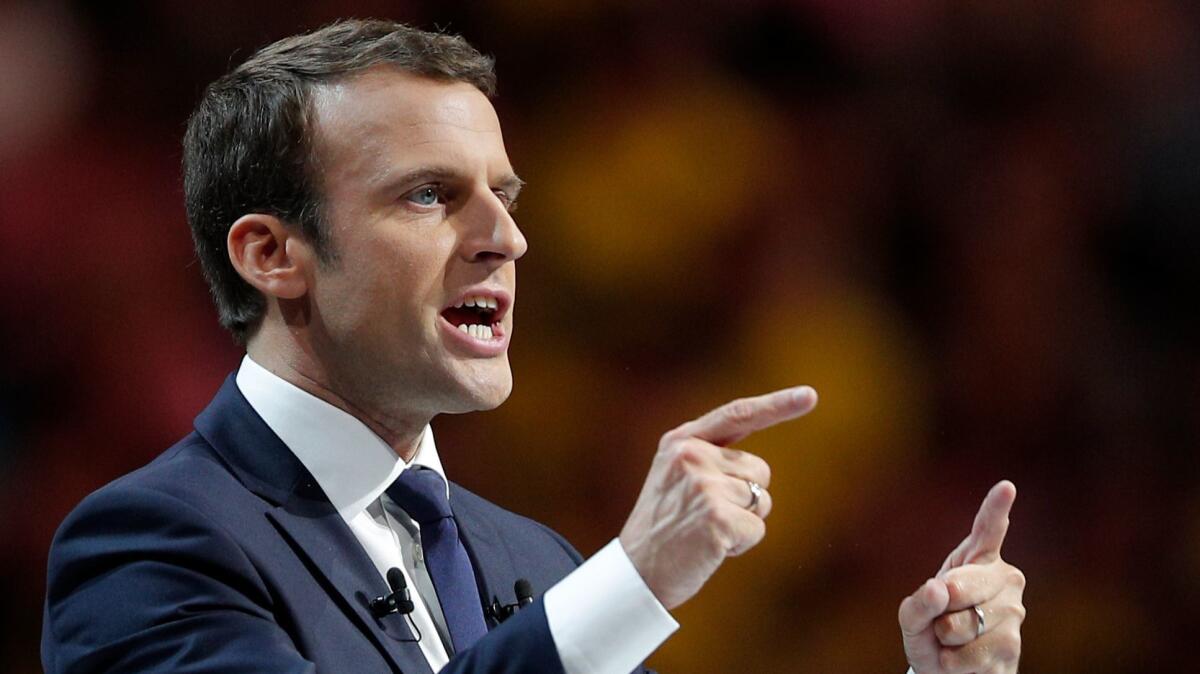France’s presidential election could help shape what’s next for an often bitterly divided Europe

- Share via
Reporting from Paris — For 44 million French voters, it is not just about choosing the person to lead them out of an economic downturn that has left them morose and frustrated, but whether that person also will take them out of Europe and bring about the collapse of the postwar European dream.
France goes to the polls Sunday for the first round of a presidential election that has been shaken by terrorism and could change the country’s relationship with the world.
As polling stations opened at 8 a.m., there was a sense that anything could happen in the next few hours before polls close — even revolution.
No pollster or political specialist has been willing to bet his shirt on the outcome. Pascal Perrineau, president of the respected Sciences Po university’s political research center, laughed when asked.
“We know that around 20% make up their mind in the two days before the vote, so there can be surprises right up to the last minute,” he said. “We can say what is possible and what is probable; we cannot say what will or will not happen.”
Marc-Olivier Padis of the Paris-based independent think tank Terra Nova described it as an “all or nothing election.” He also was not willing to predict a result. France is heading for an “enormous upheaval” is all he would say.
Normally, France picks its leaders from one of two parties, the Socialists or the Republicans. This time, in an unprecedented field of 11 candidates, the traditional left and right have been shunted aside.
Two of the four leaders, the far-right National Front leader Marine Le Pen and the far-left candidate Jean-Luc Melenchon, want to disengage either wholly or partially with the European Union, to renegotiate treaties and to turn away from globalization and capitalism.
Favorite Emmanuel Macron is a political newcomer nobody had heard of three years ago and who has never been elected to any post. The Republican candidate, Francois Fillon, is a scandal-hit former prime minister under investigation on suspicion of fraud and is in fourth place. And the Socialist Party candidate, Benoit Hamon, has plunged to fifth, according to opinion polls.

The top two vote-getters Sunday will advance to a runoff in two weeks. The most likely outcome, pollsters say, is a Macron-Le Pen final. But as the electioneering deadline passed midnight Friday, political and market analysts, and normally reliable pundits, were unable to predict the outcome with any certainty.
“As we saw from ‘Brexit’ and Donald Trump, the opinion polls are not exactly obsolete, but have their limits,” Perrineau said.
The most controversial and troubling candidate whose election would have the most far-reaching consequences is Le Pen. She wants a Brexit-style referendum to pull out of the EU and has promised to dump the euro. As part of her “economic nationalism” program, she proposes to close France’s borders, halt immigration and make “France great again” by giving the French preference for jobs, housing and social benefits. Her tough and controversial stance has captured the imagination of those struggling at the bottom of the social heap confronting stubbornly high unemployment, a fall in spending power and job insecurity, and has put her neck and neck with Macron.
On the other side of the French political spectrum, the far-left firebrand Melenchon, an anti-capitalist, anti-globalization candidate backed by France’s dwindling Communists, is in fourth place in the opinion polls but still very much in the running. Melenchon’s high-spending, high-taxing program also weakens ties with Europe; he too is a fierce opponent of any transatlantic free-trade treaties and wants a “citizens’ revolution.”
The popularity of Le Pen, currently the joint favorite with 23% in the polls, and Melenchon, who holds 19.5%, stems from a rejection of the traditional right and left parties that have governed France for more than a century. If this sounds familiar to U.S. voters, it is. The rising populism and right-wing rhetoric echoes President Trump’s campaign promises and the insular nationalism and nostalgia of Britain’s Brexit campaign.
It is a strategy of pulling up the drawbridge or circling the wagons.
It’s an election for France but also one that could have consequences for Europe and perhaps the world, which is why it’s so interesting.
— Dominique Reynie, founder of the Fondapol political research institute
The candidate currently jostling with Le Pen is independent centrist Macron, at 39, the youngest of those running. A former minister in the government of deeply unpopular Socialist President Francois Hollande, Macron has come from nowhere, having never held an elected post, and has no political party backing him. He is economically liberal but left-leaning on social issues. Macron, who worked briefly as an investment banker with Rothschild & Co., has charm, youthful enthusiasm and matinee idol looks that have critics like Le Pen suggesting he is all style and no substance.
During a live televised debate among the five main candidates, Le Pen sneered at Macron: “You’ve been speaking for seven minutes, and I’m incapable of summarizing your thoughts. You’ve said nothing,” she said before turning to the audience. “It’s an art, huh?”
Fourth man Fillon, a conservative Catholic described as France’s answer to Britain’s “Iron Lady” Margaret Thatcher, became a symbol of the turbulence of the presidential campaign. A shoo-in to win in January, Fillon’s popularity plummeted following allegations he paid his British-born wife and children hundreds of thousands of taxpayers’ money for jobs that did not exist. Fillon denied any wrongdoing but was put under official investigation, France’s equivalent of being indicted, on suspicion of fraud and forgery.
On top of the uncertainty, tensions have been heightened by the threat of terrorism and the state of emergency, introduced after the bombings and shootings in Paris in November 2015, which left 130 dead and 50,000 police and 7,000 soldiers now patrolling the country. On Sunday, France’s security forces will concentrate on major polling centers to reassure voters.
In the days before the first-round vote, police arrested two men in the southern port city of Marseille suspected of planning an “imminent and violent” attack to disrupt the election, and in Paris a suspected terrorist shot and killed a police officer and injured two others on the Champs-Elysees.
In both cases, suspects were linked to Islamic fundamentalism, allowing Le Pen and Fillon to reiterate their hawkish line on crime, security and extremism with individual declarations claiming France was “at war.” Le Pen demanded France’s borders be closed and foreigners suspected of sympathy for “the enemy” be expelled.

“In a situation that is already uncertain, it’s hard to say what impact this [terrorism threat] will have, except to add more uncertainty, and perhaps impact on people who were not sure how to vote,” Padis said.
“In any case, the timing is not good.”
Padis said the election could have consequences far beyond French borders, especially if an anti-Europe candidate wins.
“If France leaves Europe, it’s the end of Europe. The whole postwar project collapses. All the alliances collapse. It would be enormous internationally.”
After five years of Hollande’s socialist administration, unemployment in France is stuck around 10% — and twice that figure among the young — while consumer spending power has dropped, public debt remains high and growth is weak.
The U.S. Organization for Economic Cooperation and Development reported last year that a lack of economic growth was France’s “fundamental economic problem” even though it admitted the country had an “enviable standard of living.”
If France leaves Europe it’s the end of Europe. The whole postwar project collapses, all the alliances collapse. It would be enormous internationally.
— Marc-Olivier Padis of the Paris-based independent think tank Terra Nova
Dominique Reynie, founder of the Fondapol political research institute, a professor at Sciences Po and a former Republican local election candidate, agrees the election results could resonate internationally.
“It’s an election for France but also one that could have consequences for Europe and perhaps the world, which is why it’s so interesting,” Reynie said.
“The small gap between the candidates suggests we could have quite a profound upset. With four candidates quite close together, there’s great uncertainty about what will happen. We have regularly seen two candidates, Emmanuel Macron and Marine Le Pen, pull away from the others, and this has been constant in the polls. What we don’t know is if this will actually happen.”
Reynie said the only certainty is France’s next president, whoever he or she is, will face “a lot of problems.”
“This is a prediction I can make with 100% certainty,” he said.
Willsher is a special correspondent.
ALSO
French candidates condemn terrorism as officials identify gunman in Paris shooting
France is about to hold a crucial election. Here’s everything you need to know
Islamic State claims responsibility for Paris shooting that kills 1 officer and wounds 2 others
More to Read
Sign up for Essential California
The most important California stories and recommendations in your inbox every morning.
You may occasionally receive promotional content from the Los Angeles Times.










